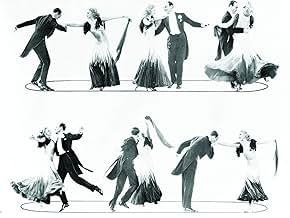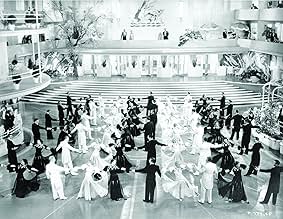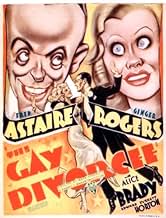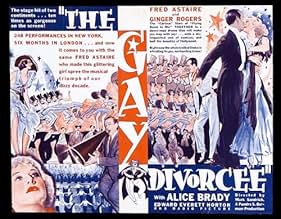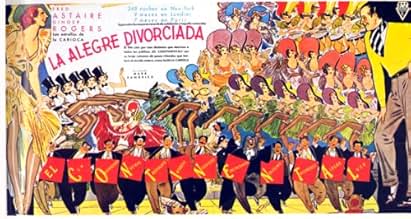Une jeune femme souhaitant divorcer simule un adultère en engageant par correspondance un homme qui se fera passer pour son amant. Elle rencontre à la douane Guy Holden, un danseur, et est p... Tout lireUne jeune femme souhaitant divorcer simule un adultère en engageant par correspondance un homme qui se fera passer pour son amant. Elle rencontre à la douane Guy Holden, un danseur, et est persuadée qu'il s'agit de son homme de paille.Une jeune femme souhaitant divorcer simule un adultère en engageant par correspondance un homme qui se fera passer pour son amant. Elle rencontre à la douane Guy Holden, un danseur, et est persuadée qu'il s'agit de son homme de paille.
- Récompensé par 1 Oscar
- 1 victoire et 5 nominations au total
- Undetermined Role
- (non crédité)
- Undetermined Role
- (non crédité)
- Undetermined Role
- (non crédité)
- Dancer
- (non crédité)
- Chorus Girl
- (non crédité)
- Dancer
- (non crédité)
- Night Club Patron
- (non crédité)
Histoire
Le saviez-vous
- AnecdotesThe musical number "The Continental" lasts 17 1/2 minutes, the longest number ever in a musical until Gene Kelly's 18 1/2-minute ballet at the end of Un Américain à Paris (1951) 17 years later. It is also the longest musical number in all of Fred Astaire and Ginger Rogers' films together.
- GaffesCrew member coughs after the chase scene, picnic basket on running board and he's going through item list directly after she says, "After that."
- Citations
Tonetti: [unable to remember his passphrase "Chance is a fool's name for fate," Tonettie repeatedly muffs it] Chance is the foolish name for fate. / Give me a name for chance and I am a fool. / Fate is a foolish thing to take chances with. / I am a fate to take foolish chances with. / Chances are that fate is foolish. / Fate is the foolish thing. Take a chance.
- Versions alternativesIn the version of the movie released in Brazil in the 1930s, the Brazilian actor Raul Roulien sang in the musical number "The Continental".
- ConnexionsEdited into Jeanne de Paris (1942)
- Bandes originalesDon't Let It Bother You
(1934)
Music and Lyrics by Mack Gordon and Harry Revel
Dance performed by Fred Astaire
In 1933, the pair had proven themselves as second leads in "Flying Down to Rio", a musical heavily relying on special effects and little else. They stole the show, proven with "The Carioca", the erotically charged dance number which started an American craze of pressing foreheads and even got the Best Song Oscar nod over the supposed show stopping title song. Before, Ginger had "42nd Street" to her name, while Fred had the famous screen test analysis of "Can't sing. Can't act. Can dance a little."
"The Gay Divorcee" is the establishing musical of Astaire and Rogers. Silly, dated, slight, even stupid to a certain degree is the entire story. Without a doubt, high comedy and immense creativity make up for it. The mistaken identity plot was recycled for "Top Hat" the following year, but it hardly matters. It is littered entirely with hilarity! Writing was never the strongest point of these musicals anyway. The performances were not Oscar calibre but they were publicly loved, and it's obviously Astaire and Roger's singing, acting and most of all, dancing, that makes the movie what it is.
A top wealth of talent was assembled for the movie. Erik Rhodes is absolutely side splitting as the Italian guy Tonetti, wielding the fabulous line, "Your wife is safe with Tonetti, he prefers spaghetti!". Alice Brady is there as Aunt Hortense, but Edward Everett Horton is another stand out performer as the lawyer. His fumbling voice provides a character of clumsiness and two seem to go hand in hand. He was definitely one of the best supporting comedians of the 1930s and 1940s, in other Astaire and Rogers musicals, and movies like "Lost Horizon", "Holiday", "Here Comes Mr Jordan" and "Arsenic and Old Lace".
Only one song was retained for the filmic version of "The Gay Divorcee". The censors even crashed down on the stage's original title "The Gay Divorce". Fred performs a great rendition of the immortal Cole Porter song "Night and Day". "The Continental", the Best Song of 1934 is thrown there in the mix too. Other great numbers in there include "Looking for a needle in a haystack", "Don't Let it Bother You" and "Let's K-nock- K-nees". The latter is performed by a young Betty Grable. This is notable for the only time Edward Everett Horton sings and dances on screen. We can see from the results there's an obvious reason.
The stylish period of courtship and even set decoration and costumes evoke great memories of eras gone by. RKO hasn't helped preservation of these technical elements by throwing what always appears to be mediocre sets, but it doesn't matter anyway. The whole thing is irresistible, spectacular and unforgettable. This is one of the forgotten musicals of the time which has it all.
Rating: 8/10
Meilleurs choix
- How long is The Gay Divorcee?Alimenté par Alexa
Détails
Box-office
- Budget
- 520 000 $US (estimé)
- Montant brut mondial
- 6 879 $US
- Durée1 heure 47 minutes
- Couleur
- Rapport de forme
- 1.37 : 1
Contribuer à cette page




